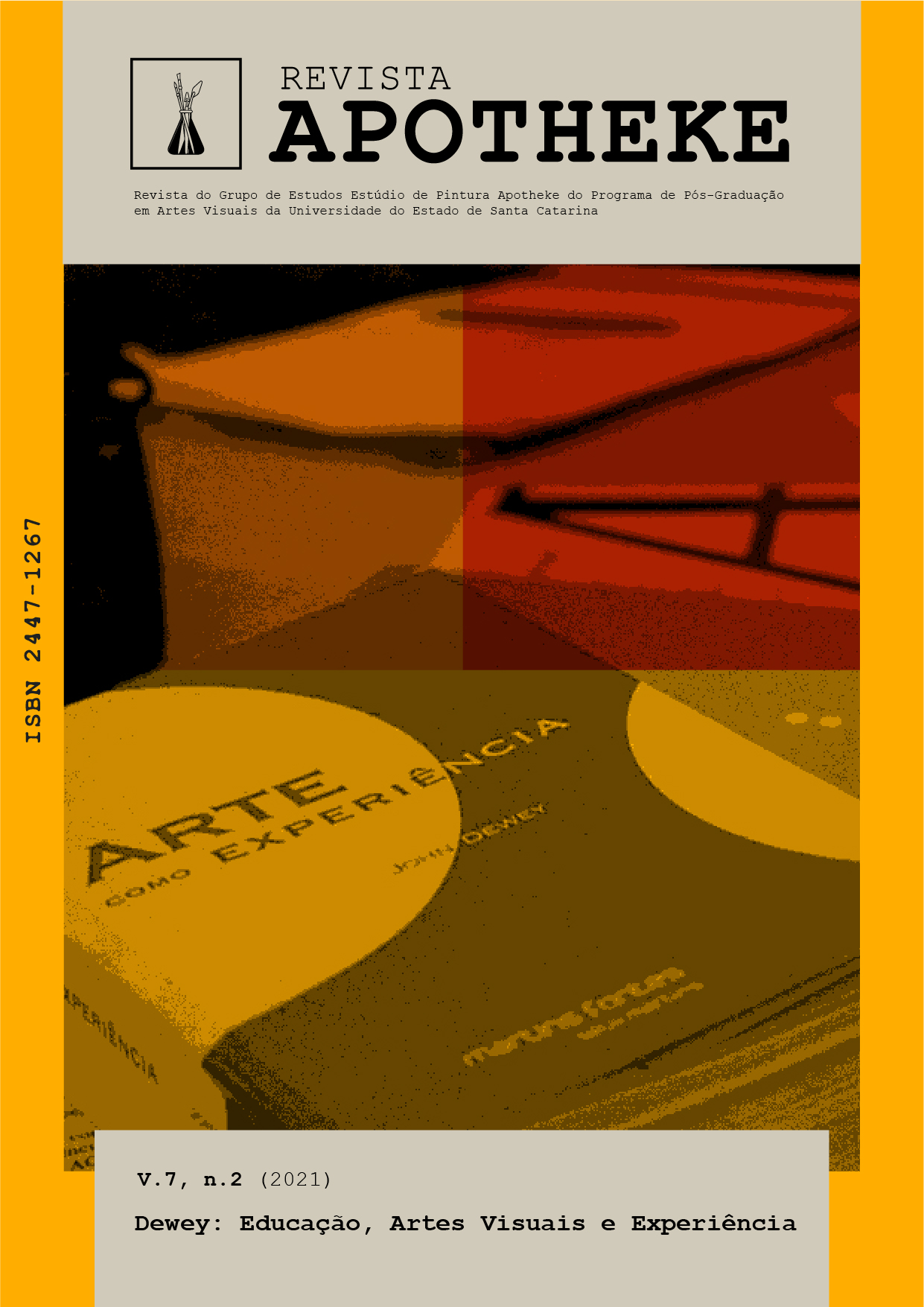Estudos sobre John Dewey: o estágio em artes visuais na educação infantil
DOI:
https://doi.org/10.5965/24471267722021116Resumo
O presente artigo tece relações entre experiência docente e estudos teóricos com o objetivo de analisar fundamentalmente as vivências do Estágio Curricular Supervisionado I, disciplina do curso de licenciatura em Artes Visuais da Universidade do Estado de Santa Catarina (UDESC). A atuação pedagógica decorrente da disciplina ocorreu na Educação Infantil, junto ao Núcleo de Educação Infantil Municipal (NEIM) Hassis, localizado em Florianópolis-SC. As teorias pedagógicas que influenciaram a pesquisa no estágio estão relacionadas com obras de John Dewey (1932, 1959, 1979a, 1979b) e amparadas por autores contemporâneos (CUNHA, CARVALHO), os quais promovem uma análise progressiva de algumas das teorias de Dewey em filosofia e educação.
Downloads
Referências
BARBOSA, Ana Mae. John Dewey e o ensino da arte no Brasil. São Paulo: Cortez, 2001.
BRASIL. Ministério da Educação. Base Nacional Comum Curricular – BNCC. Brasília, DF, 2016.
CARVALHO, Viviane Batista. John Dewey e o trabalho pedagógico na educação infantil. Curitiba: Appris, 2015.
CUNHA, Marcus Vinicius da. Dewey e Piaget no Brasil dos anos 30. Cadernos de Pesquisa, São Paulo, n. 96, p. 5-12, maio 1996.
DEWEY, John. A criança e os programas de ensino. Educação, São Paulo, v. 7, n. 4/5.Abr/maio, 1932.
DEWEY, John. Vida e Educação. Tradução de Anísio Teixeira. 5. ed. São Paulo: Nacional. 1959.
DEWEY, John. Como Pensamos, como se relaciona o pensamento reflexivo com o processo educativo: uma reexposição. Tradução: Haydée Camargo Campos. 4. ed. São Paulo: Nacional, 1979a.
DEWEY, John. Democracia e Educação. Tradução de Godofredo Rangel e Anísio Teixeira. São Paulo: Nacional, 1979b.
FLORIANÓPOLIS. Secretaria Municipal da Educação. Creche Hassis. Projeto Político Pedagógico. Florianópolis, SC, 2015.
LLENAS, Anna. O monstro das cores. Lisboa: Nuvem de Letras, 2020. 3ª ed.
SANTA CATARINA. Secretaria de Estado da Educação. Currículo base da educação infantil e do ensino fundamental. Florianópolis: SEE, 2019.
Downloads
Publicado
Como Citar
Edição
Seção
Licença
Copyright (c) 2021 Miguel Vassali

Este trabalho está licenciado sob uma licença Creative Commons Attribution-NonCommercial 4.0 International License.
Os autores de trabalhos submetidos à Revista APOTHEKE autorizam sua publicação em meio físico e eletrônico, unicamente para fins acadêmicos, podendo ser reproduzidos desde que citada a fonte. Os mesmos, atestam sua originalidade, autoria e ineditismo.
Os artigos publicados pela revista são de uso gratuito, destinados a aplicações
acadêmicas e não comerciais. Os direitos autorais são todos cedidos à revista. Os artigos cujos autores são identificados representam a expressão do ponto de vista de seus autores e não a posição oficial da Revista Apotheke. O(s) autor(es) se compromete(m) a sempre que publicar material referente ao artigo publicado na Revista Apotheke mencionar a referida publicação da seguinte forma:
"Este artigo foi publicado originalmente pela revista Apotheke em seu volume (colocar o volume), número (colocar o número) no ano de (colocar o ano) e pode ser acessado em: http://www.revistas.udesc.br/index.php/APOTHEKE/index"
É responsabilidade dos autores a obtenção da permissão por escrito para usar em seus artigos materiais protegidos pela Lei de Direitos Autorais. A revista Apotheke não é responsável por quebras de direitos autorais feitas por seus colaboradores.
Os autores mantêm os direitos autorais e concedem à revista o direito de primeira publicação, com o trabalho licenciado sob Licença Creative Commons do tipo atribuição BY-NC:
Atribuição (BY): os licenciados têm o direito de copiar, distribuir, exibir e executar a obra e fazer trabalhos derivados dela, conquanto que deem créditos devidos ao autor ou licenciador, na maneira especificada por estes.
Uso Não comercial (NC): os licenciados podem copiar, distribuir, exibir e executar a obra e fazer trabalhos derivados dela, desde que sejam para fins não comerciais.
Após a publicação dos artigos, os autores permanecem com os direitos autorais e de republicação do texto.




